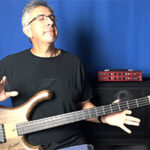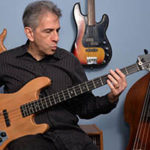Learning bass despite pushback from your body
By Jon Liebman
December 16, 2022
I don’t know about you, but I’m not as young as I used to be. When I think back on all those gigs I used to play back in the ‘80s, often 12 shows a week or even more, I don’t know how I did it.
That was during my years in Miami, where the clubs stayed open late. Really late. I’d get home after 4:00 a.m., then do it all over again the next day. I must have been crazy!
One thing that hasn’t faded as I’ve become more mature (ha!) is my love of music and my passion for playing and bass.
Most of the people coming to For Bass Players Only identify as “old rockers,” generally men over 50 who want to learn bass and play the music they love.
Things ain’t what they used to be
As you’ve probably discovered by now, when you’re over 50 (and especially when you’re over 60 or 70), a lot of the things aren’t so easy any more.
Ailments like arthritis, tendonitis, carpal tunnel syndrome and other bodily nuisances are pretty common among FBPO students. And if you’ve had surgery, that can make playing bass even more challenging.
Fortunately, my Groove Grower™ framework inside the Bottom Line Club membership has made learning bass a lot easier for these people. What’s more, I’ve had students finding all kinds of workarounds to help with their bass playing, everything from doing yoga to switching to short-scale basses and making changes to their bass technique.
Advice from experts
I always make a point of asking each of my weekly FBPO interviewees what advice they have for someone who wants to learn bass, particularly older students.
This week’s interview with the always upbeat Tim Starace provided yet another great opportunity to gather some useful tips. Tim plays in a band called YYNOT, which is described as “an original progressive rock band with a marked propensity for playing vintage Rush covers.”
When I told Tim about the type of students I have at FBPO, he could immediately relate to what they’re going through and happily chimed right in.
“I’m getting older,” Tim says. “I’m getting those little bumps on my knuckles. My pinky isn’t as flexible as it used to be, you know? My right hand kind of gets sore…”
Immediately recognizing that he’d made his point, I asked him what he recommends for someone over 50 who wants to learn bass. Here are 5 things he had to say:
1 – Take care of your ears
“I’d like to tell all you future and senior bass players out there, take care of your ears, man. Take care of your ears,” he says.
I’m guessing you don’t play music to be as loud as you used to back in the day. But seeing an alarming number of musicians with hearing loss or impairment should be a stark reminder for all of us to listen to our music at a responsible volume.
Pete Townshend’s hearing damage is widely known. According to Academy Hearing Centres, other rockers on the list include Neil Young, Ozzy Osbourne, Phil Collins, Brian Wilson, and Eric Clapton.
“It’s an oft overlooked aspect,” Tim says, “but that’s one thing you can’t get back once that starts to go away. Take care of your ears.”
2 – Playing bass after surgery
A lot of my students have had various types of surgery as well, everything from hip and shoulder replacement to various other operations.
Tim can relate to that too. A couple years ago, he underwent surgery to repair his arm after suffering an accident while he was helping install an air conditioning unit.
“This tendon that attaches to my forearm from my bicep split in half,” he explains. “I couldn’t even turn the doorknob.”
He’s still been playing bass, but not without obstacles.
“My arm kind of hurts,” he says. “I have numbness in two fingers, which just comes and goes. Sometimes it gets really bad.”
Recovery was a long, slow process, which included months of physical therapy and regular workouts with his “little purple weights.”
Somehow, he even managed to do a little bass playing with his cast on. A lot of people would have given up on playing bass after what he went through, but Tim’s determination is exemplary of his drive and grittiness.
3 – Should you try modifying your bass technique?
Over time, I’ve shared a lot of examples of people who have tweaked their bass technique, often in response to things like physical trauma or tendonitis, or because their bodies just aren’t built like everyone else’s.
I told Tim how I receive emails just about every day from students who have found alternative solutions for playing bass which they found incredibly helpful, like holding their hands differently, playing short-scale basses, etc.,
“I wish I had something like that for you, man,” Tim says, “but I’ve always been the type of guy (that) if I gotta go from point A to point B and there’s a wall in between it, I’m just gonna bang it on the wall until I bust through!”
That’s just part of Tim’s loveable personality! He is what he is. J
“I’m afraid if I change my technique in any way I won’t sound like me anymore,” he says. “I’m very reliant on my technique, as awful and as wrong as it is, but it’s how I sound like me.”
You can take what you want from Tim’s approach on this one. Most people would try modifying some aspect of their bass technique in order to accommodate a physical issue. It’s up to you. Whichever route you take, be careful!
4 – Learn music theory
Tim suggests a study of theory and harmony, the more the better.
“There’s something I can recommend to people,” he says. “Learn music theory. Learn as much as you can of it. Sometimes when I’m around all the musicians and they’re talking (music theory), I feel like I’m not up to speed with what they’re talking about.”
Despite a lack of theoretical knowledge, he’s managed to do all right. When Tim plays the bass, it’s not academic or overthought. It all comes from his gut, his heart and soul.
“I’m such an emotional player,” he says. “I really don’t know much about music theory. I just learned what the bottom number on the time signature means!” he adds, with a laugh.
Still, he wishes he knew more.
“That’s the one thing I regret,” Tim says, “not learning you know music theory and how to be able to convey what I mean to other people and understand what they’re telling me. And I could imagine how that would pay huge dividends with not that much work.”
5 – Have fun!
So, what’s Tim’s biggest piece of advice for people who want to learn bass?
“They should be thinking about having fun,” he says, emphatically. “This has always been my main thing.”
If you’ve ever seen Tim perform, you know he’s for real.
“Bro, I am up there having the time of my life!” he tells me. “I really am. You know, I’m not up there staring at my neck like I’m taking a math test. I’m up there having fun with the people!”
Whatever your reason is for wanting to learn bass, we know what Tim’s is.
“Nothing’s worth doing unless you’re having a blast,” he says. “And I really enjoy doing this.”
Good advice for sure. Despite what your body tries to tell you.
Your turn. How about you? What issues, physical or otherwise, are you dealing with regarding your bass playing? How are you coping with them? Leave a comment below and share your thoughts. And be sure to watch my interview with Tim here.






Great article!
Thanks, I of B. I hope you got a lot out of it!
I had/have Carpal Tunnel Syndrome (riding motorcycles is bad for this too!) and it was either quit altogether or radically change my bass and technique. I chose the latter. Here’s what I now have/do:
1. Short scale, fretless bass with low action
2. Flat wrists
3. Soft hands
4. Allow thumb to come over the top as it wants to
Almost all online bass teachers say “one finger per fret and thumb positioned behind second finger”. This is a guaranteed route to CTS in the long run. This technique came about because everyone wanted to be Jaco. If you just want to be a meat and potato bassist (you know, the type that bands actually want), watch Paul McCartney play and you’ll see he does what I’m talking about and is still playing after 60 plus years. The other influence on me was Carol Kaye. Same deal: she keeps the thumb to the left of her fingers and moves all the fingers as one. Bottom line: tension-free hands at all times is the go. If you’re straining you’re heading for problems, period
I could write a book about this topic… it’s been quite the journey for me. If anyone wants to follow up I’m happy for Jon to pass on my email (if he’s happy about that of course). Hope this helps someone as I know the pain 😎.
Thanks for sharing, Grayden. I’m glad you’re finding ways to continue playing bass. The left thumb technique would take a bit of getting used to, but if that’s what it takes, go for it! 🙂
I began playing bass in 1964 in a rock & roll band. We were together for about 5 years. After that I played off and on with a few others. Then I got married and had to get a “real” job. Fast forward to 2007, I joined a new Cowboy Church and found myself trying to play bass again. With some good help from a couple of awesome musicians I’m doing pretty good with the songs we play. I broke my right wrist in 2009 (I’m right-handed) and after the cast came off after surgery, I was able to play with a brace on. Just had to adjust the strap a little differently. In 2019 I tore my left bicep tendon off the bone and had it reattached. For 6 weeks I couldn’t lift anything, and I mean anything. So for a couple of weeks I sat on a stool and played. Then I went back to standing, just made sure my left arm wasn’t holding any weight. In February, 2023, I’ll be 73. I have no plans to slow down. Thanks for a great article.
Very inspiring story! I love how you refuse to let anything keep you down. Thanks for sharing, George. Keep it up!
Hearing. Yes!
As Tim pointed out as his very first thing when you asked in your interview with him. The reference to Pete Townshend is missing a detail though. Pete said himself that it was the use of headphones used too loud when he was in his home studio and working on music – and as he said himself, slugging down lots of cognac during these sessions didn’t help with the excessive volume. He attributes his tinnitus and hearing loss (not always connected) with headphone volume.
I read an article by the inventor of in-ear plugs (sorry, I’ve forgetting the reference) who said he watched accumulated dust on his plugs during testing that suddenly danced over the surface. He realized at that moment that earbud style and the like act as tiny pneumatic hammers > directly onto our eardrums. ! Pang pang pang!
Use phones with surround muffs at low volume and stay away from ear buds and like direct input devices.
A friend who travelled internationally with a popular band for seven years told me the arena gigs with in-ear monitors seemed to have been harder on his hearing than using just ear plugs and his stage sound.
There are practical ways around most arthritis and bad carpel tunnel avoiding technique. Torzel bass necks, Dingwall’s slanted frets, avoiding the hook technique especially (wrist pencil straight, like a punch man!). But once your hearing is effed, it is effed. There is no getting it back. 1st in your concern.
(and avoid shitty motorcycle helmets as well!)
Thanks, Pete!
When our son left for the Navy 9 years ago, I started playing his Squire J Bass. I have played and studied guitar since I was 11 years old(69 now). After a few months, I was hooked. Fast forward 9 years, I read well enough to get by, and have great ears and along the way, I’ve acquired 6 more bass guitars. To say I’m having fun is an understatement. Wish I had started on bass when I was a kid, but the years of theory and playing have really helped.
You’re in the right place, Patrick. Welcome home! 🙂 It doesn’t matter that you didn’t start playing bass when you were a kid. All that matters is that you’re doing it now. Thanks so much for sharing your story.